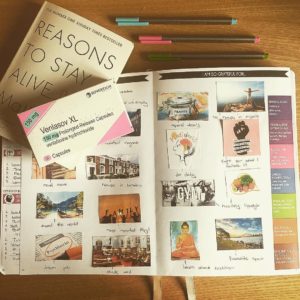As part of Mental Health and Wellbeing Week 2019, medical student Heather McAdam reflects on her own experience and encourages others to speak out when they are struggling.
 I am Heather, a third year medical student intercalating in Global Health Policy. Mental health is an issue that has affected me my whole life: from family illness in childhood and poor mental health amongst my friends as a teenager; to falling mentally ill myself. The subject has also been something that has confused me as to why it happens and why we don’t talk about it more. So, I have made it my lifelong mission to help spread the word and support others before it gets too late and I hope this post gets me a little bit closer towards that goal!
I am Heather, a third year medical student intercalating in Global Health Policy. Mental health is an issue that has affected me my whole life: from family illness in childhood and poor mental health amongst my friends as a teenager; to falling mentally ill myself. The subject has also been something that has confused me as to why it happens and why we don’t talk about it more. So, I have made it my lifelong mission to help spread the word and support others before it gets too late and I hope this post gets me a little bit closer towards that goal!
Let’s not beat about the bush: medical school is hard. Despite the culture we create for ourselves, none of us could have been here without the occasional sleepless night and sometimes even pushing ourselves beyond our limits to an unhealthy extent. Unfortunately for me, this led to a slippery slope where I failed to acknowledge my diagnoses of generalised anxiety disorder and depression, leading to brushes with suicide and taking time out from medical school. However, despite that being (hopefully) the most terrifying and hellish year of my life, it was actually also one of the best things that happened to me.
Now, I am not at all saying that you need to hit rock bottom to find out what the top looks like (please try not to!), but taking time away from the chaos, pressures and expectations of what everybody else believes or wants is one of the most important things you can do in life. Even if that’s just for a part of your day, it helps you to evaluate what your goals are how you are feeling. For, as the overused anecdote goes: “you must put on your own oxygen mask before you put on someone else’s”. So, even though I am still learning, I thought I’d share what really worked for me to become more aware when things are not okay and, with time, more happier in myself!
 Write it down
Write it down
I do not say this lightly: writing changed my life.
It’s not that I write best-selling novels, nor do I ever aspire to, but taking your thoughts and visualising them in a palpable way made my brain finally feel less imprisoned. When I was at my worst, I could barely put a sentence together. I was worried that I had lost everything and had no idea of where to go. However, once I started putting everything down, through stories, rants, mind maps and whatever else you could think of, I could start rebuilding where I wanted to go in life. All my negative or anxious thoughts soon made little sense and I could pick out the real me and what actually mattered.
Even today, if I ever feel overwhelmed, I will either write a cathartic story on my blog (this helps provide context and re-evaluation of negative thoughts about previous events) or jot everything down as a mind map on a piece of scrap paper (this helps me tick everything off which is manageable/I have achieved and worry less about the future).
One of the best things I did was the ‘100 days of happiness’ challenge where, for 100 days, you take a photo and share it with a caption about why it made you happy. Not only does this make you appreciate the small things more (my posts ranged from milkshakes to escaping to New Zealand!), but it is really refreshing to watch other people’s wholesome reflections on what is normally intimidating social media.
Start small
When I was at my worst, I could barely get out of bed. For a long time, I would beat myself up and accuse myself of wasting life away when I really needed time to rest and recover. I only started to get better when I stopped believing I could build Rome in a day (spoiler: nobody can) and felt accomplished when I could leave me room tidy and with a freshly-made bed.
In the chaotic and high standard society we live in today, this is obviously easier said than done. One of the best way I worked around this was with mindfulness. This is an ancient concept with a simple philosophy: to focus on the breath. Some people practise this literally, which is brilliant, but it can even be taken to encompass focus on the smallest of things, from the smell of the air to how trees move. It was training myself to appreciate how beautiful even the most basic things we take for granted can be, that inspired to realise that I can beat whatever mental challenges come my way.
 Focus on ‘could’ rather than ‘should’
Focus on ‘could’ rather than ‘should’
Looking back, I think a big trigger for me was getting caught in the ‘medics bubble’. I had come from an academically-poor school to a cohort full of national athletes and distinguished prize winners. Imposter syndrome became extremely real. Instead of focusing how much I had overcome to get where I was today, I was trying to reach an imaginary foundational with my new peers that just was not necessary. The wonderful thing about medical school is that you are all going towards the same process towards the same goal. You are all worthy of getting here and all more than capable of becoming successful doctors in your own right. You just need to pass. Enjoy your years studying the subjects you enjoy, meet new people and don’t forget to live a life outside of the classroom!
When I started medical school, it would take up my thoughts all day, every day. Now, it’s just part of my life, rather than the other way round. I shape my university experience to be what I want from life, ranging from starting and leading the Medical School’s wellbeing group and being a representative on student council to using it as a platform for traveling the world and meeting some of the most wonderful people. I make my learning something that is mine and enjoyable, not a case of passing the next exam and a slog. You are truly at one of the most fantastic stages of your life: the world is your oyster so get out there and utilise it!
Remember: it’s not your fault
No matter what the outside picture may portray, I still struggle. There will be days were I struggle to get out of bed, fail to attend classes and just want to cry. There will be frustrated conversations with the doctor as to why the waiting lists are so long and I still need to get monthly assessments for my meds. There will even be days where I even question the point in trying. However, looking back from how far I have come, from constant self-punishment and barely being able to physically function, I know the bad cards I have been dealt will never be allowed to define me.
Mental illness can be as unclear as physical illness when it comes to the cause. Two identical people can grow happily together until one becomes crippled by their mysterious disease and the other is unaffected. It is horrible and often life-changing. However, one message we need to make absolutely clear to everyone is: it’s not your fault. You are not weak, you are not a bad human and you do not have to have a bad fate.
With the help of the most fantastic support networks to speak out and stay motivated, I have been able to not let poor mental health define me. Yes, I have lost friends and many a tear along the way, but these struggles have allowed me to see the world in a beautiful new light and use my disadvantages to help others falling to where I did. That is why it is absolutely vital to spread the word, reach out and realise both in ourselves and others: it’s okay to not be okay.



